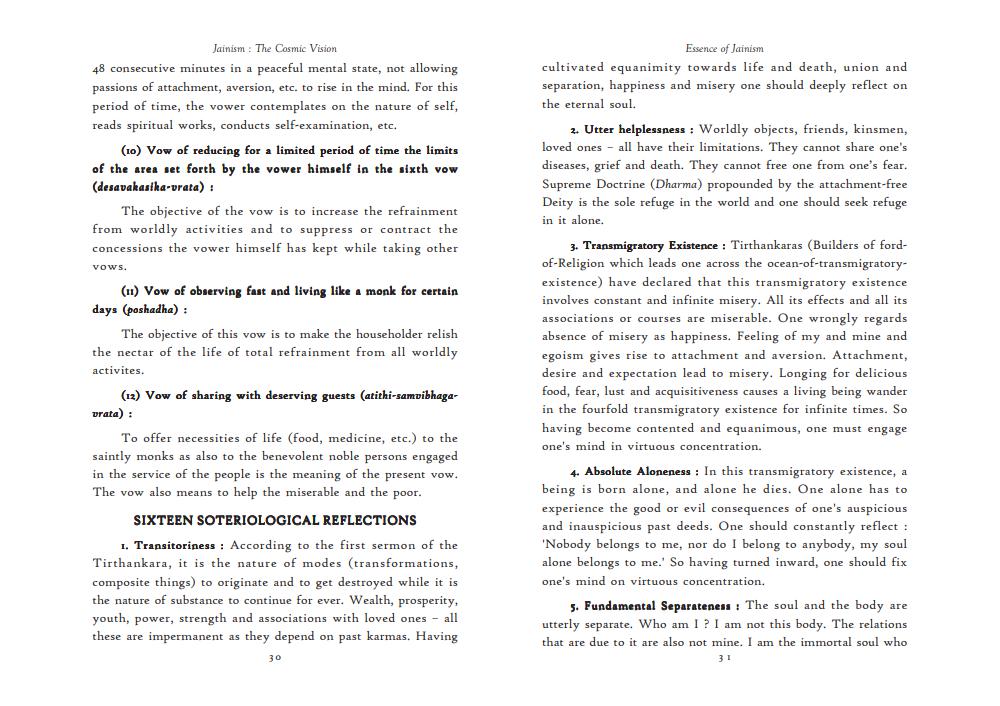________________
Jainism: The Cosmic Vision 48 consecutive minutes in a peaceful mental state, not allowing passions of attachment, aversion, etc. to rise in the mind. For this period of time, the vower contemplates on the nature of self, reads spiritual works, conducts self-examination, etc.
(10) Vow of reducing for a limited period of time the limits of the area set forth by the vower himself in the sixth vow (desavakasika-vrata):
The objective of the vow is to increase the refrainment from worldly activities and to suppress or contract the concessions the vower himself has kept while taking other vows.
(11) Vow of observing fast and living like a monk for certain days (pashadha) :
The objective of this vow is to make the householder relish the nectar of the life of total refrainment from all worldly activites
(12) Vow of sharing with deserving guests (atithi-samvibhagavrata) :
To offer necessities of life (food, medicine, etc.) to the saintly monks as also to the benevolent noble persons engaged in the service of the people is the meaning of the present vow. The vow also means to help the miserable and the poor.
SIXTEEN SOTERIOLOGICAL REFLECTIONS
Essence of Jainism cultivated equanimity towards life and death, union and separation, happiness and misery one should deeply reflect on the eternal soul.
2. Utter helplessness : Worldly objects, friends, kinsmen, loved ones - all have their limitations. They cannot share one's diseases, grief and death. They cannot free one from one's fear. Supreme Doctrine (Dharma) propounded by the attachment-free Deity is the sole refuge in the world and one should seek refuge in it alone.
3. Transmigratory Existence : Tirthankaras (Builders of fordof-Religion which leads one across the ocean-of-transmigratoryexistence) have declared that this transmigratory existence involves constant and infinite misery. All its effects and all its associations or courses are miserable. One wrongly regards absence of misery as happiness. Feeling of my and mine and egoism gives rise to attachment and aversion. Attachment, desire and expectation lead to misery. Longing for delicious food, fear, lust and acquisitiveness causes a living being wander in the fourfold transmigratory existence for infinite times. So having become contented and equanimous, one must engage one's mind in virtuous concentration.
4. Absolute Aloneness : In this transmigratory existence, a being is born alone, and alone he dies. One alone has to experience the good or evil consequences of one's auspicious and inauspicious past deeds. One should constantly reflect : "Nobody belongs to me, nor do I belong to anybody, my soul alone belongs to me.' So having turned inward, one should fix one's mind on virtuous concentration.
5. Fundamental Separatenen : The soul and the body are utterly separate. Who am I? I am not this body. The relations that are due to it are also not mine. I am the immortal soul who
1. Transitoriness: According to the first sermon of the Tirthankara, it is the nature of modes (transformations, composite things to originate and to get destroyed while it is the nature of substance to continue for ever. Wealth, prosperity, youth, power, strength and associations with loved ones - all these are impermanent as they depend on past karmas. Having




